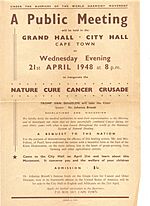Grape therapy facts for kids
Grape therapy, also known as ampelotherapy, is a type of alternative medicine that suggests eating a lot of grapes, including their seeds and parts of the vine like leaves, can make you healthy. However, there is no real scientific proof that this works, and many experts consider it an unproven treatment.
Contents
What is Grape Therapy?
Grape therapy is based on the idea that eating grapes and parts of the grape vine can offer special health benefits. People who support this idea believe grapes have unique powers to help your body. But scientists have not found strong evidence to support these claims.
Grapes and Your Health
Grapes do contain some good things for you, like B vitamins, vitamin C, calcium, and potassium. They also have tiny amounts of copper, iron, and zinc. However, the amount of these nutrients can change a lot depending on how the grapes are processed. Raw grapes mostly give you carbohydrates (energy) and vitamin K.
Some parts of grapes, like the seeds and skin, contain special plant compounds called proanthocyanidins, anthocyanins, and resveratrol. Scientists are studying these compounds to see if they have any effects on the body. But right now, there's no clear proof that these compounds from grapes can treat diseases.
The History of Grape Therapy
The idea of using grapes for health goes back a long time. One of the first times it was written about was in 1878 by V.N. Dmitriev, who wrote about "Treatment With Grapes in Yalta." Later, in the 1920s, doctors in the Soviet Union also worked on these ideas.
Johanna Brandt and the Grape Diet
A South African author named Johanna Brandt helped make the grape diet popular in 1925. She wrote many books and pamphlets about natural ways to stay healthy. Her most famous book was The Grape Cure. She claimed she cured herself of stomach problems by following this diet. Her book was even republished later with support from Benedict Lust, who is known as "the father of naturopathy."
Grapes and the "French Paradox"
In the late 1980s, some people thought that a compound called resveratrol, found in grapes, might explain something called the "French paradox." This was an idea that French people had fewer heart problems even though they ate a lot of fatty foods. Some thought it was because they consumed grapes.
However, even though resveratrol is sold as a dietary supplement, there's no strong scientific proof that it helps prevent heart disease or other health issues. For example, a study in Italy looked at older people who ate a diet rich in resveratrol. It found no connection between their diet and rates of heart disease, cancer, or how long they lived.
How Grape Therapy is Used
Johanna Brandt's grape diet suggested a very strict plan. First, you would fast for a couple of days, drinking only cold water. Then, for one to two weeks, you would eat only grapes and drink water, having seven small meals a day. After that, you would slowly add other foods like fresh fruits, tomatoes, and some dairy products, followed by raw vegetables.
Today, grape therapy is still offered in some alternative medicine clinics and spas, especially in Europe. Sometimes it's combined with "vinotherapy," which is a beauty treatment where grapes are rubbed onto the skin.
It's important to remember that while grapes are a healthy food, there is no scientific evidence that grape therapy can cure serious diseases like cancer, arthritis, or diabetes. Always talk to a doctor or healthcare professional for medical advice.


